Congratulations, Dictator!
Adelina Marini, November 4, 2015
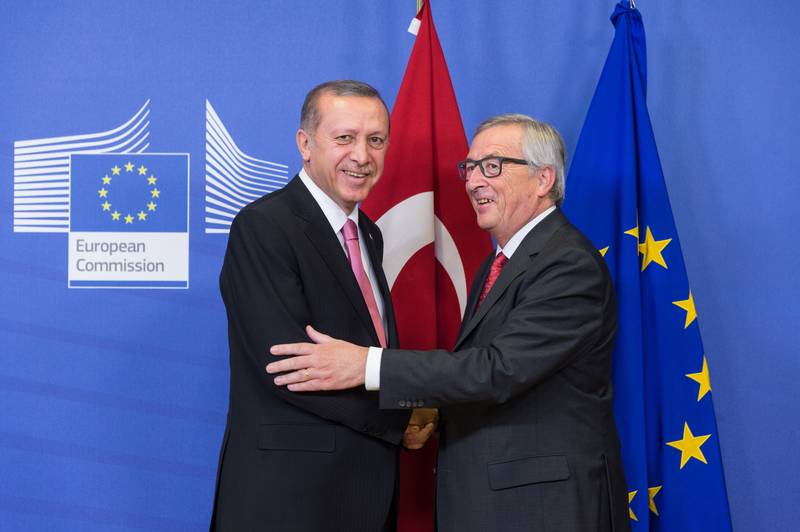 Election results in Turkey cemented the authoritarian governance of the country and stood the EU at a dilemma, which it has been trying to avoid for years – what to do with Turkey. The Union is facing two possibilities – one is choosing the attitude of European Commission President Jean-Claude Juncker towards Hungary PM Viktor Orbán, which was brilliantly illustrated during the EU summit with the states of the Eastern Partnership in Riga, when veteran Jean-Claude Juncker met Mr Orbán with the words “The dictator is coming. Dictator”, followed by a warm hug and a resounding playful slap on the cheek. The other attitude is for the EU to return to its intrinsic values. However, it is exactly the Orbán example that makes the latter difficult. If the EU chooses the first approach it means that the Union will fall into major internal troubles, for authoritarianism is gaining more and more territory in the EU, masked somewhere as nationalism, other places as euro-scepticism, but in general, at many places, showing a clear tendency towards restriction of freedoms.
Election results in Turkey cemented the authoritarian governance of the country and stood the EU at a dilemma, which it has been trying to avoid for years – what to do with Turkey. The Union is facing two possibilities – one is choosing the attitude of European Commission President Jean-Claude Juncker towards Hungary PM Viktor Orbán, which was brilliantly illustrated during the EU summit with the states of the Eastern Partnership in Riga, when veteran Jean-Claude Juncker met Mr Orbán with the words “The dictator is coming. Dictator”, followed by a warm hug and a resounding playful slap on the cheek. The other attitude is for the EU to return to its intrinsic values. However, it is exactly the Orbán example that makes the latter difficult. If the EU chooses the first approach it means that the Union will fall into major internal troubles, for authoritarianism is gaining more and more territory in the EU, masked somewhere as nationalism, other places as euro-scepticism, but in general, at many places, showing a clear tendency towards restriction of freedoms.
Although the major groups in the European Parliament are already noticing the damages they are taking on because of black sheep in their ranks, the fact that almost every large European political family has some black sheep is relaxing them and is hardly likely to cause any internal catharses. This means that the Union will silently open the door to the second possibility, namely negotiating with totalitarian leaders and recognising them as equal partners. The problem with European values is further burdened by having the most-problematic candidate states for a EU membership not 100% dedicated to achieving it. To them, joining the EU is a strategic task, but exactly the fact of it being one allows it to be changed if it proves to be hard to achieve or does not look to be likely to bring the expected dividend. The biggest loser from all this will be the Union itself and its security. The two problematic candidates are Turkey and Serbia.
The EU knows not what to do with Turkey
On November 1st, at the snap parliamentary elections, full majority was surprisingly won by the party of President Recep Tayyip Erdoğan (AKP). Independent international monitors admit that the elections were held in a complicated security environment and with strong pressure on media. The preliminary conclusions of the Organisation for Security and Co-operation in Europe (ironically, presided this year by Serbia) are voicing serious concerns about freedom of speech. “Media freedom remains an area of serious concern and the number of criminal investigations of journalists and the closure of some media outlets, reduced voters’ access to a plurality of views and information”, says in the report of the OSCE election bureau. It is also noted that the threshold of 10% for entering parliament further restricts political pluralism. Violence in the last two weeks, preceding the elections, has limited the freedom of some candidates to lead freely their election campaign, says also in the OSCE report on elections in Turkey.
Notwithstanding, the EU sent out divergent and even contradicting messages. In a joint statement the head of European diplomacy, Federica Mogherini (Italy, Socialists and Democrats), and Enlargement Negotiations Commissioner Johannes Hahn (Austria, EPP) are noting that elections in Turkey, held at a very high turnout (over 85%), “have reaffirmed the strong commitment of the Turkish people to democratic processes”. Their statement was published before the OSCE report, so in it both of them are expressing expectations towards the preliminary findings and conclusions. Regardless, it is difficult to imagine what it is about the election results that could be interpreted as a strong commitment to democratic processes.
The most votes received Erdoğan’s Justice and Development Party (AKP) – 49.4% or 317 seats in the 550-seat Meclis, which means full majority. Runner-up is the Republican People’s Party (CHP), led by Kemal Kılıçdaroğlu, which gathered 25.4% of votes, or 134 seats. Third place is for the nationalists with 11.9% and the pro-Kurdish party with 10.7%. As evident from the OSCE report, media freedom was seriously hampered. This is a fact that is no news neither to Ms Mogherini, nor to Mr Hahn. European Council President Donald Tusk, in contrast, spared no criticism. In a letter of congratulations, published after the release of the OSCE report, he congratulates PM Ahmet Davutoğlu with the election victory, but reminds that elections took place in a “difficult security environment, and against the background of an increasingly restrictive media situation”.
“On the basis of the renewed trust invested in you and a new government, I trust that every effort will now be made to build confidence in the society, strengthen the rule of law and fundamental freedoms and engage constructively with the political opposition. I also hope that the Kurdish peace process will be resumed as soon as possible, building on the good progress made up until last summer”, says further Donald Tusk’s brief letter of congratulations, who speaks on the behalf of member states. Apart from it every one of the 28 member states sent its own letter of congratulations. Only they are a protocol formality, which does not represent the real attitude of the state towards what is happening in Turkey. The EU strongly relies on any Turkish government to help curb the influx of refugees from Syria, Iraq, and other countries with heavy military conflicts or economic problems.
This goal is of paramount importance to the survival of the Union itself, which, due to lack of unity in dealing with the crisis, finds itself at the brink of real disintegration. This is why it looks like, in the name of avoiding this, the Union is prepared to sidestep its own values. This was evident from Jean-Claude Juncker’s speech in front of the European Parliament last week, in which he stated unequivocally that the conversation about freedom of press and human rights will in no way contribute to the solving of the refugee crisis. In the name of having Turkey maximally well-disposed, the European Commission for the first time delayed significantly the publishing of the annual progress reports for the countries in the enlargement process. European Commission spokesperson Mina Andreeva announced on Tuesday (November 3rd) that although there is still no certain date for their publishing, the Collegial discussion has already started. Presentation of the reports to the foreign affairs committee of the EP is scheduled for November 9th by Commissioner Hahn.
Furthermore, the European Commission is actively at work on the reinstatement of the negotiation process with Turkey, which has for all practical purposes been totally frozen. The last negotiation chapter with Turkey was opened on November 5th 2013. It was Chapter 22, which covers regional development. In June, the Commission proposed to the Council that this year Chapter 17 “Economic and monetary policy” be opened. Spokesperson for EU Foreign Affairs & Security Policy Maja Kocijančič said there is still a chance for this chapter to be opened by the end of the year. Talks on it in the working groups of the Council are still going on. She also said that the Commission will, in the very beginning of next year, present an updated screening report of Turkish legislation, connected to several chapters, among which the key ones 23 and 24, which cover rule of law, media freedom, human rights, and minority rights, as well as the “Energy” and “Education and Culture” chapters.
These chapters, however, are among the eight, blocked by Cyprus in 2009 because of Turkey’s refusal to sign the additional protocol with the EU after Cyprus joined the EU in 2004. The Commission is working hard to “re-energise” the process, calling on the conclusions of the European Council from October 15th, where the leaders of the 28 share their support, without however stating any actual details. From several leader’s comments it becomes evident there is no unanimity on opening new chapters, let alone unfreezing old ones. This was quite evident during the appearance of the German chancellor and French president in front of the EP in October.
Serbia - time to panic yet?
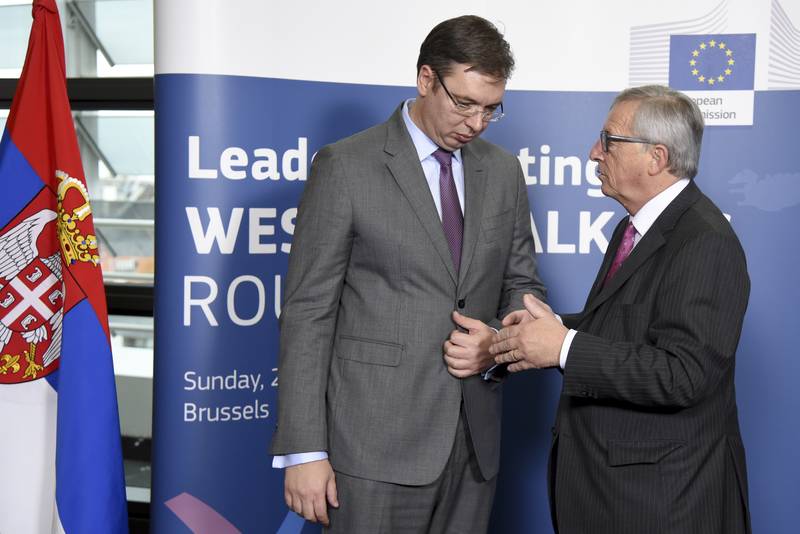 This is one more key state in the enlargement process, which is also bound on an authoritarian road and is hardly the only one in the region. Semi-authoritarian are also Montenegro, Macedonia, and to some extent Kosovo. At this stage, however, this seems the lesser problem. The larger one is that Serbia continues to be a strong ally to Russia and the two states are using each other to achieve their goals in the EU. Serbia wants to immediately begin real negotiations, delayed so far because of weak implementation of agreements from the process of normalisation of relations with Kosovo, and is already losing patience. Belgrade was hoping that the first negotiations chapters (23 and 24, or any other) to be opened as early as last year, but this did not happen and is quite unlikely it will happen this year either. Russia, on the other hand, is using Serbia to confirm its influence on the Balkans, which it considers within its sphere of influence.
This is one more key state in the enlargement process, which is also bound on an authoritarian road and is hardly the only one in the region. Semi-authoritarian are also Montenegro, Macedonia, and to some extent Kosovo. At this stage, however, this seems the lesser problem. The larger one is that Serbia continues to be a strong ally to Russia and the two states are using each other to achieve their goals in the EU. Serbia wants to immediately begin real negotiations, delayed so far because of weak implementation of agreements from the process of normalisation of relations with Kosovo, and is already losing patience. Belgrade was hoping that the first negotiations chapters (23 and 24, or any other) to be opened as early as last year, but this did not happen and is quite unlikely it will happen this year either. Russia, on the other hand, is using Serbia to confirm its influence on the Balkans, which it considers within its sphere of influence.
Serbia is becoming more and more nervous because of the lack of progress on its road to European membership and also by the lack of unanimity regarding the refugee crisis. This nervousness is portrayed in sending troubling messages across, like the arms deal for example, negotiated by PM Aleksandar Vučić during his visit to Moscow last week. It was evident by German Chancellor Angela Merkel’s statement from Monday morning in Darmstadt that the region is more and more often looked at as a threat. During her party’s meeting, she warned that closing the Austrian-German border could lead to igniting military conflicts in the Balkans. Quite a scary admittance that the EU and member states in particular have missed something important along the way. This important thing is tolerating a government with dubious past. Croatian PM Zoran Milanović vehemently denied any such worries, and so did his Serbian counterpart Aleksandar Vučić. The latter stated that he understands full well Merkel’s concerns, but the region is fed up with warring. “We will do everything in our power to preserve peace and stability in the region”, he assured.
All this goes to show that the current enlargement process is unable to deal with such serious obstacles like authoritarian governments not just in the enlargement process, but within the Union itself. Rebuffing of the most-problematic candidate states with the excuse that they are drifting further from the European system of values will only increase the risk on Union security. Accepting them could lower risk in the short run, but will doom the EU to disintegration in the long run, unless it denounces its values itself and accepts that a dictatorship is part of the European “political diversity”. This will, however, be a huge disappointment to the millions of people, who are counting that exactly the EU will be exerting pressure on their governments to guarantee their rights and freedoms, instead of jokingly greeting them “Dictator!”.
Translated by Stanimir Stoev
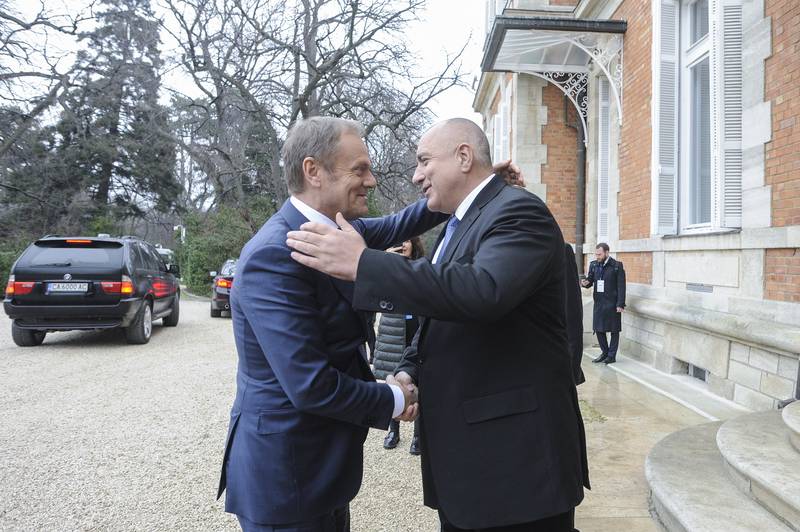 Donald Tusk, Boyko Borissov | © Council of the EU
Donald Tusk, Boyko Borissov | © Council of the EU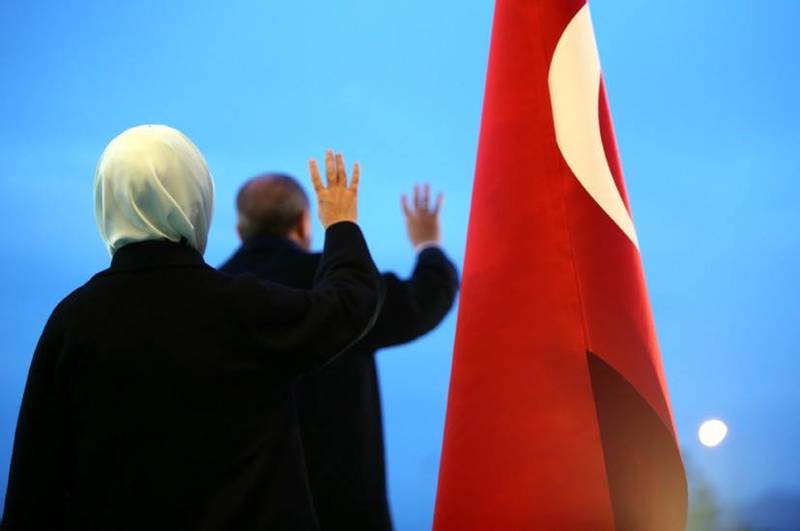 | © Turkey Presidency
| © Turkey Presidency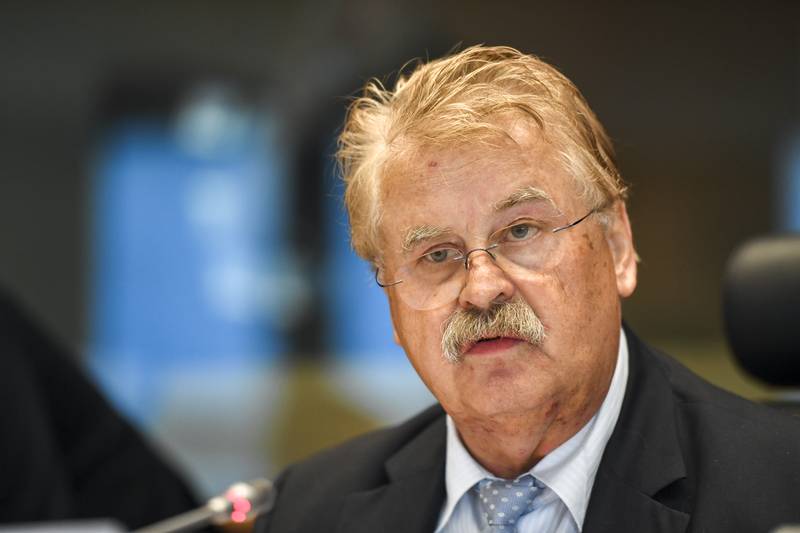 Elmar Brok | © European Parliament
Elmar Brok | © European Parliament Bakir Izetbegovic, Andrej Plenkovic | © Council of the EU
Bakir Izetbegovic, Andrej Plenkovic | © Council of the EU Aleksandar Vucic, Recep Tayyip Erdogan | © Serbian Presidency
Aleksandar Vucic, Recep Tayyip Erdogan | © Serbian Presidency Jean-Claude Juncker, Zoran Zaev | © European Commission
Jean-Claude Juncker, Zoran Zaev | © European Commission